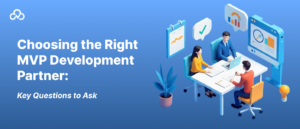Choosing the Right MVP Development Partner: Key Questions to Ask

Starting a new product? Then you already know the to-do list grows fast, market research, wireframes, pitch decks. But one decision quietly shapes everything else: who’s going to help you build your MVP? It’s easy to treat this like a technical formality. Just code, right? But that choice, your MVP partner, can impact more than the build. It influences how quickly you learn, how efficiently you spend, and how strong your foundation really is. Some teams focus purely on shipping. Others obsess over product strategy. Finding someone who can strike the balance between execution and adaptability, that’s where things get interesting. This piece isn’t just another agency checklist. It’s a deeper look at how to evaluate custom MVP development partners, what to ask them up front, and why your decision now can determine how far, and how fast, you actually get.
Why Your MVP Partner Matters
Let’s be honest: early-stage product development is messy.
You don’t know exactly what users want yet. You’re trying to move fast, stay lean, and avoid spending on things that might not matter. And this is exactly why your custom MVP development partner matters more than you think.
If they’re only focused on code delivery, you’ll probably launch something that technically “works”, but doesn’t get used. Or worse, something that’s impossible to scale when you do start to grow.
But if your team understands MVP for software development, they’ll do more than code. They’ll slow down when it counts, ask uncomfortable questions, and help you kill features that are just noise.
That’s what separates MVP development consultants and experienced product teams from freelancers or templated builds. The good ones don’t just deliver, they think alongside you.
Here’s what good MVP execution really looks like:
-
Prioritizing user flows that give you real behavior data
-
Designing features you can test, not just ship
-
Keeping the architecture flexible enough to change direction
-
Measuring success in terms of insight, not output
And when you go with custom MVP development instead of a generic template, you’re giving yourself space to grow. It’s not about building more, it’s about building right.
What Is Custom MVP Development?
At its core, custom MVP development is about creating something that fits your product, not forcing your product to fit someone else’s framework. Unlike plug-and-play templates or no-code solutions, custom MVPs are tailored to match your feature set, tech requirements, and future plans.
Instead of working around limitations, you start with a clean slate. That gives you more flexibility, especially if you’re building a platform that requires unique logic, integrations, or a modular architecture you’ll scale later.
|
Feature |
Template/No-Code MVP |
Custom MVP Development |
|
Feature flexibility |
Limited |
High |
|
Ownership and scalability |
Often restricted |
Full code ownership |
|
Cost (initial) |
Lower upfront |
Higher, but with long-term value |
|
Fit for complex products |
Poor |
Strong |
This isn’t to say templates don’t have their place. They’re useful for short experiments or internal tools. But for anyone serious about MVP for software development, especially in regulated industries or B2B platforms, going custom from the beginning is usually the safer, and smarter, choice.
Key Traits of a Reliable MVP Development Partner
So what should you look for in an MVP development partner?
It’s not just about technical chops (though those matter). It’s about how they think, communicate, and respond when things inevitably change. Because with agile development MVP workflows, change is the constant.
Here are some qualities worth digging into when evaluating a potential partner:
- They focus on outcomes, not just features.
Rather than rushing to build everything on the wishlist, they pause to ask whether each feature actually helps you learn.
- They work in sprints, with feedback baked in.
This is key to an effective agile development MVP cycle. Regular check-ins, tight feedback loops, and fast turnarounds matter.
- They bridge technical and business thinking.
Especially early on, your team needs to understand both the tech stack and the market landscape. The best MVP development consultants can speak both languages.
- They flag issues early.
Whether it’s timeline slips or feature creep, the right team won’t stay quiet about risks, they surface them early so you can adjust.
- They stick around after launch.
MVPs are just the beginning. Your partner should be ready to iterate, improve, and scale with you once users get involved.
Questions to Ask Before Hiring an MVP Partner
To choose the right team, you need to ask the right questions. These aren’t just box-checkers, they’re conversation starters that reveal how an agency or custom MVP development consultant truly operates.
- Can you walk us through a past agile development MVP project?
Ask about iterations, feedback loops, pivots, and what went wrong, those details matter.
- How do you validate features during development?
Do they just build, or do they test, measure, and refine?
- What’s your typical approach to custom MVP development?
Look for structured discovery, phased builds, and a willingness to simplify when needed.
- How do you support clients post-launch?
Make sure they’re not just handing off code and disappearing.
- What happens if the scope changes mid-build?
Agile projects evolve. If they can’t adjust, they’re not truly agile.
Red Flags to Watch Out For
Even experienced teams sometimes fall into predictable traps. Here are a few red flags to keep an eye on:
- Rigid timelines with no discovery phase: If they promise to deliver in 30 days before learning about your product, walk away.
- Vague answers about ownership: You should own your codebase, IP, and infrastructure. No exceptions.
- No process for feedback or analytics: A good MVP isn’t just usable, it’s measurable.
- Overuse of buzzwords without a clear method: If they say “agile” but never mention sprints, retros, or user stories, be cautious.
The Role of an MVP Development Consultant
Sometimes, a full agency isn’t what you need, especially in the early phases. That’s where an MVP development consultant can be useful. They offer lean, high-level support to help define product scope, guide technical decisions, and align MVP features with market needs.
Think of them as your technical co-pilot. They may not write all the code, but they help ensure what’s built serves a purpose. And if you’re already working with an agency, a consultant can help hold them accountable and keep your roadmap focused.
Example: A SaaS founder brought in a consultant after struggling with a bloated MVP backlog. Within two weeks, they cut 60% of the planned features and launched a testable product in four sprints, with measurable results in week one.
How to Evaluate MVP Development Agencies
Finally, when comparing potential partners, don’t just look at portfolios, dig deeper.
- Ask for real case studies with outcomes, not just mockups.
- Speak to past clients about communication and flexibility.
- Request a sprint breakdown to understand how they plan and track work.
- Compare estimates carefully, not just by price, but by delivery model, testing rigor, and strategic support.
Technical FAQs
Q1: What’s the difference between a consultant and an MVP agency?
A consultant advises, plans, and supports. An agency typically builds. You can hire both, or one, depending on budget and team structure.
Q2: Is custom MVP development more expensive?
Yes, upfront. But over time, it often costs less, because you’re not rebuilding, patching, or starting over when scale becomes necessary.
Q3: How does agile development affect MVP delivery?
Agile allows you to test and adapt during development, so you reduce wasted features and align the product with what users actually want.
Q4: What’s the most important question to ask MVP development agencies?
Ask: “How do you know if what we’re building is worth building?” Their answer will tell you whether they’re focused on delivery, or validation.
Choose for Vision, Not Just Velocity

The MVP isn’t your final product, it’s your learning engine. And the team you pick to build it should understand that from day one.
This isn’t about checking boxes or rushing to launch. It’s about clarity. Testing real demand. Building infrastructure that doesn’t break the moment users arrive.
There are plenty of MVP development agencies out there. But only a few will help you grow in the right direction, not just move fast.
So when choosing your partner, don’t just look for speed. Look for someone who gets your vision, sharpens your thinking, and gives your MVP the best shot at becoming something much bigger.
Do you like to read more educational content? Read our blogs at Cloudastra Technologies or contact us for business enquiry at Cloudastra Contact Us